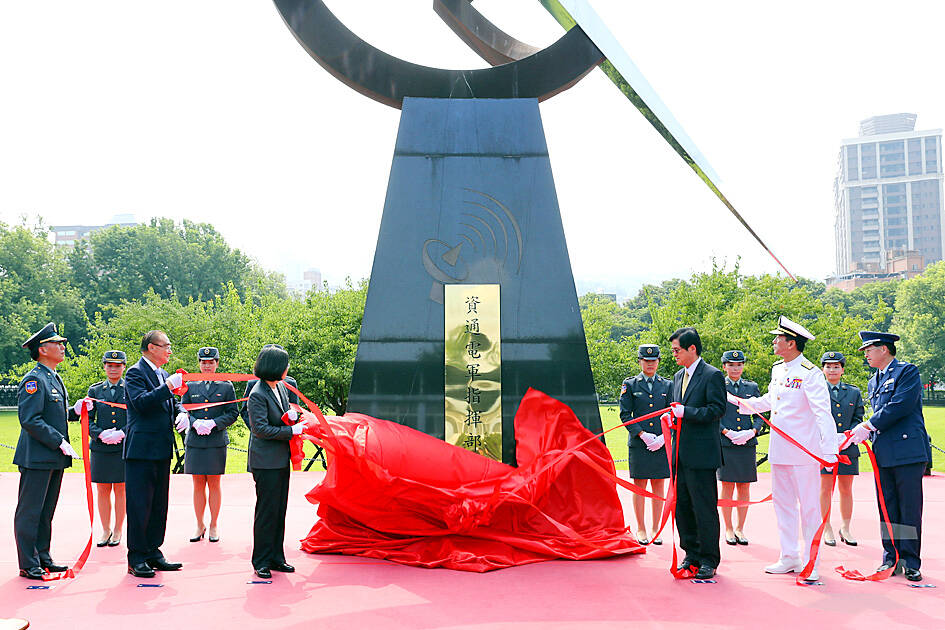Beijing’s claims that a Ministry of National Defense (MND)-backed organization was behind cyberattacks targeting Chinese Internet infrastructure is a typical Russian cognitive warfare tactic aimed at diverting the attention of Chinese from unpopular government policies, a defense analyst said.
On Monday last week, the Chinese Ministry of State Security wrote on WeChat that the MND’s Information, Communications and Electronic Force Command (ICEFCOM) was funding a hacker group called “Anonymous 64.”
The post said the group had seized control of Web sites, outdoor electronic billboards and video-on-demand platforms in China, Hong Kong and Macau.

Photo courtesy of Military News Agency
The hackers’ activities included spreading false information, creating rifts in the public and weakening the governance of the Chinese Communist Party, it said.
In an analysis published on the Web site of the Institute for National Defense and Security Research, an MND think tank, policy analyst Tseng Min-chen (曾敏禎) wrote that China’s accusation seeks to divert Chinese public’s attention from a bill the Chinese National People’s Congress passed on Sept. 13 increasing the legal retirement age from 60 to 63 for male workers who do not hold a managerial position, from 50 to 55 for female workers and from 55 to 58 for female executives in a 15-year span starting from next year.
The legislation has caused considerable discontent among Chinese, which was followed by Beijing’s hacking accusation, Tseng said.
The claim was pulled directly from Russia’s cognitive warfare playbook, which centers on the “four Ds” — “distract” attention, “distort” facts, “dismiss” the opponent and “dismay” the intended audience, she said.
Referring to the WeChat post, she questioned why the Chinese government was so slow to respond and only mentioned the alleged cyberattacks now, after claiming the activities began in 2017 shortly after the ICEFCOM was created.
The Chinese agency identified three people who are allegedly active members of Taiwan’s military and under investigation by Chinese authorities for their involvement in the cyberattacks.
That is a legal warfare tactic aimed at generating dismay and rattling Taiwanese, Tseng said.
On Monday last week, ICEFCOM denied China’s accusations.
Beijing is attempting to cover up that China is itself a hotbed of hackers, and Taipei should devise responses to counter China’s cognitive warfare, Tseng said.
Following the accusation, many people have criticized the government online for funding an “Internet army,” a response that plays into Beijing’s hands, as China can easily exploit the comments by sharing them with the Chinese public, thus achieving its goal of distraction, she said.

Chinese Nationalist Party (KMT) Chairman Eric Chu (朱立倫), spokeswoman Yang Chih-yu (楊智伃) and Legislator Hsieh Lung-chieh (謝龍介) would be summoned by police for questioning for leading an illegal assembly on Thursday evening last week, Minister of the Interior Liu Shyh-fang (劉世芳) said today. The three KMT officials led an assembly outside the Taipei City Prosecutors’ Office, a restricted area where public assembly is not allowed, protesting the questioning of several KMT staff and searches of KMT headquarters and offices in a recall petition forgery case. Chu, Yang and Hsieh are all suspected of contravening the Assembly and Parade Act (集會遊行法) by holding

PRAISE: Japanese visitor Takashi Kubota said the Taiwanese temple architecture images showcased in the AI Art Gallery were the most impressive displays he saw Taiwan does not have an official pavilion at the World Expo in Osaka, Japan, because of its diplomatic predicament, but the government-backed Tech World pavilion is drawing interest with its unique recreations of works by Taiwanese artists. The pavilion features an artificial intelligence (AI)-based art gallery showcasing works of famous Taiwanese artists from the Japanese colonial period using innovative technologies. Among its main simulated displays are Eastern gouache paintings by Chen Chin (陳進), Lin Yu-shan (林玉山) and Kuo Hsueh-hu (郭雪湖), who were the three young Taiwanese painters selected for the East Asian Painting exhibition in 1927. Gouache is a water-based

Taiwan would welcome the return of Honduras as a diplomatic ally if its next president decides to make such a move, Minister of Foreign Affairs Lin Chia-lung (林佳龍) said yesterday. “Of course, we would welcome Honduras if they want to restore diplomatic ties with Taiwan after their elections,” Lin said at a meeting of the legislature’s Foreign Affairs and National Defense Committee, when asked to comment on statements made by two of the three Honduran presidential candidates during the presidential campaign in the Central American country. Taiwan is paying close attention to the region as a whole in the wake of a

OFF-TARGET: More than 30,000 participants were expected to take part in the Games next month, but only 6,550 foreign and 19,400 Taiwanese athletes have registered Taipei city councilors yesterday blasted the organizers of next month’s World Masters Games over sudden timetable and venue changes, which they said have caused thousands of participants to back out of the international sporting event, among other organizational issues. They also cited visa delays and political interference by China as reasons many foreign athletes are requesting refunds for the event, to be held from May 17 to 30. Jointly organized by the Taipei and New Taipei City governments, the games have been rocked by numerous controversies since preparations began in 2020. Taipei City Councilor Lin Yen-feng (林延鳳) said yesterday that new measures by